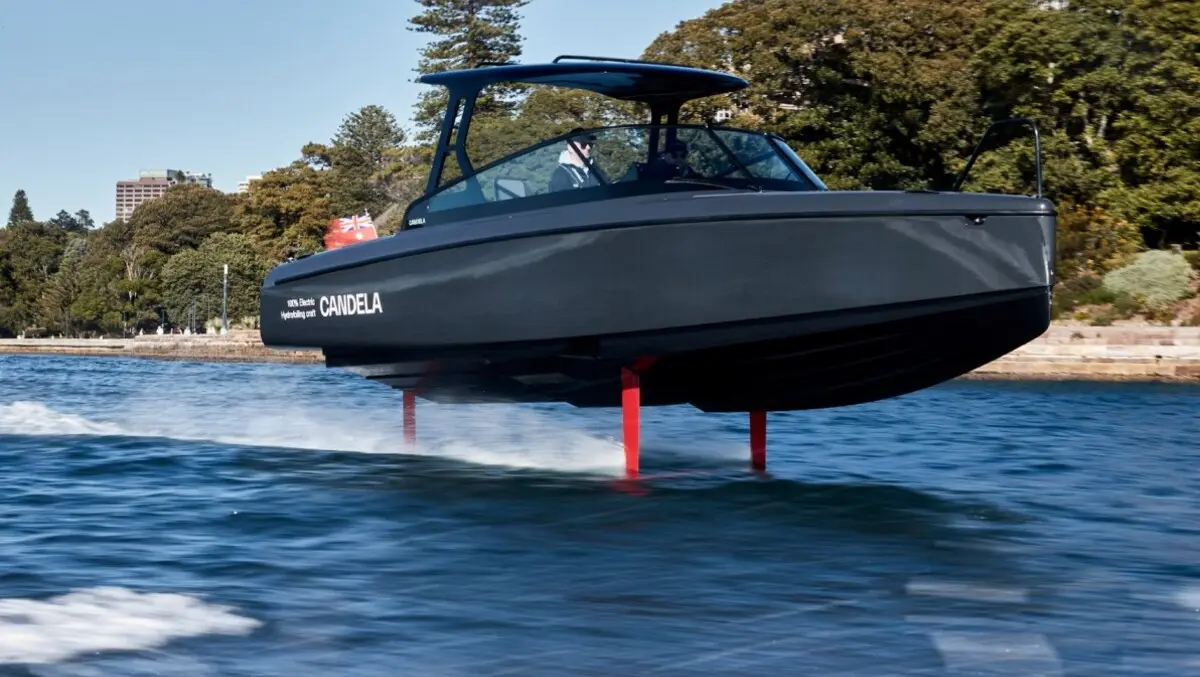
First all-electric powerboat makes its debut in Sydney Harbour
The first all-electric powerboat designed to rival diesel and petrol-powered vessels has arrived in Sydney Harbour. The Candela C-8, introduced to Australia by Carbon Yachts, is considered the fastest long-range electric powerboat on the market today. Capable of reaching speeds of up to 30 knots and covering a distance of 57 nautical miles, the C-8 employs computer-controlled hydrofoils to elevate the vessel above the water's surface, reducing resistance, minimising wake, and consuming 80% less energy than traditional boats of comparable size.
The C-8's electric motor is situated in a pod beneath the surface, enabling near-silent operation even at speeds over 20 knots. This advanced technology, including continuous adjustments to the hydrofoils' angle of attack up to 100 times per second for stable flight height and balance, contributes to the vessel's efficiency. The boat is also outfitted with a 69kWh power pack from Polestar, allowing for a fast charge in just 30 minutes.
Carbon Yachts has described the C-8 as a "genuine industry game changer" in terms of technology and sustainability. Mary Bickley of Carbon Yachts said, "Combining cutting-edge technology with a commitment to sustainability, the C-8 represents the future of boating. It offers a dramatic improvement in comfort when compared with conventional powerboats."
The vessel will be showcased at the Sydney International Boat Show from 1 August to 4 August. Attendees will have the opportunity to experience the vessel firsthand through demonstrations of its design features and superior performance and exclusive daily test flights on Sydney Harbour.
The arrival of the C-8 follows the installation of Australia's first fast-charging station for electric boats at Sydney's Pittwater, marking the beginning of an infrastructure rollout meant to make electric boats more viable for users in the region. "There's been a surge in interest in electric boats across Australia," Bickley noted. "The C-8's design and performance have set a new standard for innovation within the marine industry, highlighting the potential for electric boats to offer luxury, performance, and sustainability."
Swedish company Candela, established in 2014, is behind the development of the C-8. The C-8's success comes on the heels of Candela's P-12, reportedly the world's first electric flying passenger ferry, which entered service in Stockholm earlier this year as part of a nine-month pilot programme. The P-12 can seat up to 30 passengers, has a top speed of 30 knots, and a range of 50 nautical miles while cutting operational costs in half compared to conventional diesel boats.
Gustav Hasselskog, founder and CEO of Candela, explained the company's vision. "Hydrofoils are the key to cracking the code for electric-powered, long-range, high-speed travel on the water," he stated. "We set out to make the first no-compromise electric boat with maximum range and speed, but we ended up with a new and improved class of craft, which also happens to be electric."
Hasselskog further emphasised the advantages of hydrofoil technology, describing the experience as "a far superior experience to old-school hulls with combustion engines. Boaters no longer must contend with vomit-inducing pitching and slamming or the deafening roar from revving outboard engines. It's hard to return once you've experienced flying above the surface in absolute silence."
Hasselskog also mentioned the potential for the P-12 ferry in Sydney, saying, "Sydney is also an ideal place for our P-12 ferry. We could easily electrify waterborne transport here, offering faster journeys for passengers and lower costs for the operators."


